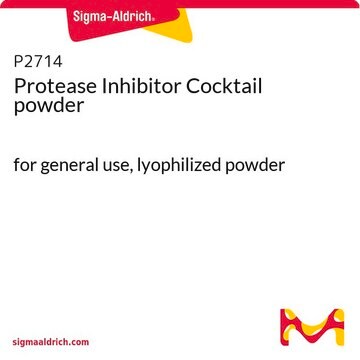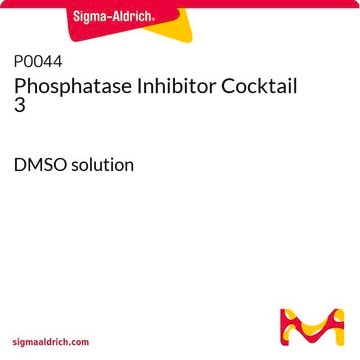539132
Protease Inhibitor Cocktail II
lyophilized, for the inhibition of aspartic, cysteine, serine, metalloproteases and aminopeptidases. This small molecule/inhibitor is primarily used for Protease Inhibitors applications.
Synonym(s):
Protease inhibitor cocktail
About This Item
Recommended Products
product name
Protease Inhibitor Cocktail Set II, The Protease Inhibitor Cocktail Set II controls the activity of Protease. This small molecule/inhibitor is primarily used for Protease Inhibitors applications.
Quality Level
form
lyophilized
manufacturer/tradename
Calbiochem®
storage condition
OK to freeze
desiccated (hygroscopic)
shipped in
wet ice
storage temp.
−20°C
General description
1 set (1 vial of protease inhibitor cocktail plus 1 vial of 1.0 ml DMSO)
5 sets (5 vials of protease inhibitor cocktail plus 5 vials of 1.0 ml DMSO)
Specificity
Application
Biochem/physiol Actions
Aspartic, cysteine, serine, and metalloproteases as well as aminopeptidases
Warning
Reconstitution
Legal Information
Signal Word
Warning
Hazard Statements
Precautionary Statements
Hazard Classifications
Eye Irrit. 2 - Skin Irrit. 2
Storage Class Code
10 - Combustible liquids
Flash Point(F)
188.6 °F
Flash Point(C)
87 °C
Certificates of Analysis (COA)
Search for Certificates of Analysis (COA) by entering the products Lot/Batch Number. Lot and Batch Numbers can be found on a product’s label following the words ‘Lot’ or ‘Batch’.
Already Own This Product?
Find documentation for the products that you have recently purchased in the Document Library.
Customers Also Viewed
Our team of scientists has experience in all areas of research including Life Science, Material Science, Chemical Synthesis, Chromatography, Analytical and many others.
Contact Technical Service















